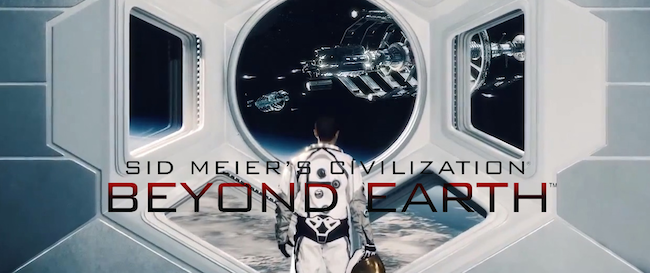
The Civilization series has an enduring legacy littered with broken spacebars, bleary eyes, and the crushed cities of Gandhi’s enemies. We all like to joke of the vice-like grip the series has on those hapless souls locked into the classic 4X gameplay, but time and time again it’s not hard to find yourself locked into the “just one more turn” mentality. Beyond Earth is the spiritual successor of 1999’s Sid Meier’s Alpha Centauri, but otherwise marks a departure from the series. In the future, Earth as we know it is dying, and humanity’s hopes lay with spaceships sent by multi-national corporations loaded with pioneers to find a new place for us to call home. This instalment will feel familiar to Civilization V veterans as they share the same foundations, but Beyond Earth works hard in design and gameplay to feel unique; to varying degrees of success.
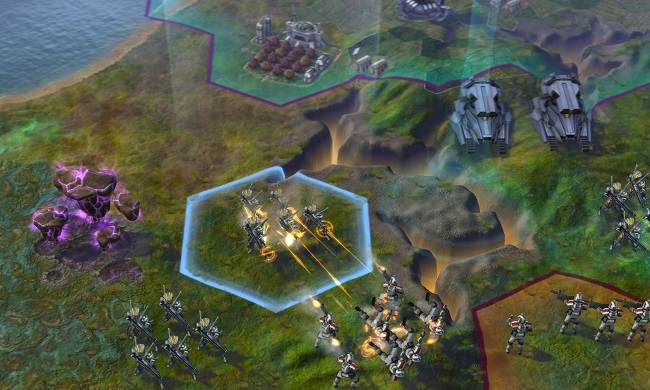
Humanity’s expansion into space is about more than just becoming the most dominant nation or culture. Rather, it’s about what we want the future of humanity to be; a poignant question with Earth’s near destruction in the rear-view mirror. Earth’s pioneers are represented by eight multi-national organisations called Sponsors (Earth’s salvation was left to the free market, apparently.) Each has a fictional leader, as opposed to the usual iconic leaders of the Civilization series. Beyond Earth’s story is buried in the civilopedia and is, like most Civ games, fairly unobtrusive.
Narrative is told mostly through gameplay in the form of quests and the technological direction your civilisation takes. Committing to a particular victory scenario or technology path (more on that later) is more like deciding the philosophy, and in some cases, evolution of humanity. Essentially, it’s a lesson in hindsight: should we learn from our mistakes and embrace change, or do we simply just try again but this time with lasers? Unfortunately, there’s no alien factions (as of yet, but I’d put money on future DLC including them), but there is alien life to contend with. The aliens are bestial, but sentient, and aren’t merely the “barbarians” of this world. Humans have a choice of living with and learning from them, or destroying them to achieve their own goals.

Of course, it all depends on the player and if they want to delve into the philosophical machinations of colonisation and life after Earth; story is never an explicit part of gameplay. PC Gamer’s Richard Cobbett said, in his article Civilization: From Alpha Centauri To Beyond Earth, that while Alpha Centauri has story, Beyond Earth has lore. What he means, which I agree with, is that Beyond Earth is peppered with background information that has little to no impact on the game. The different leaders have different sound-bites and backgrounds, but there’re no discernable differences in their actions or motivations. A bit more narrative colour in the gameplay would have saved Beyond Earth from the blandness it suffers.
Beyond Earth brings a few new features to the series while still keeping true to the Civilization formula. The hex tiles and unstackable units of Civ 5 are back, as is diplomacy and climbing tech trees. This time the tech tree is a non-linear “web” that allows players to go deeper into each technology, and also rewards players that commit to a certain path. The open paths do make research paths quite daunting and it isn’t intuitive enough to give an easy overview of what each path leads to. The tech web is tied to Beyond Earth’s Affinity system that also relates to how the colonies interact with their new world. Affinity points are awarded through quests, technology and certain actions which are divided into three categories: Harmony, Purity and Supremacy.
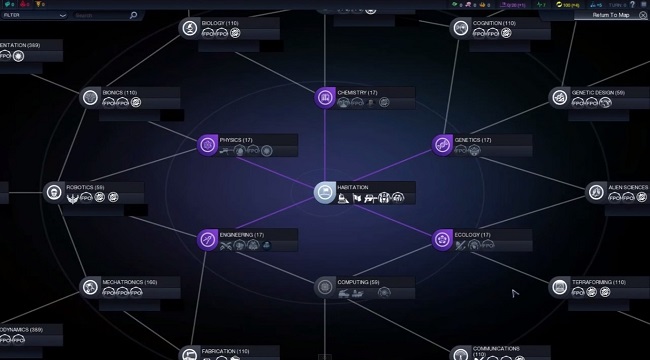
Committing fully to an affinity opens up other victory conditions, plus other bonuses, units and wonders. Purity is all about carrying on the Old-Earth ways, sans-disaster, regardless of the new world’s ecology. Harmony involves connecting with the planet and its wild-life to the point of hybridisation. Supremacy melds technology into humanity with the eventual goal of transcending to a digital consciousness. Affinities don’t necessarily dictate your gameplay style, just the type of victory or technologies you’d like to use. It’s an interesting system, but it does mean a critical path needs to be adopted early to have a chance at any victory aside from crushing the other colonists into dust.
Alongside the victory tracker is a quest log that constantly updates as new technology is researched, buildings are built or discoveries are made. It acts as gentle reminders to players to expand their colony, adopt technology and a way add a little backstory to the planet. Ancient ruins can be explored or hulking tunnel worms can be destroyed, with rewards in the way of currency or Affinity points. Following the quests aren’t entirely necessary but are nice short-term goals to follow when stuck in a flat period of colony expansion. Colonies inly have access to a small number of units, but they change and upgrade along with the Affinities and whatever upgrade paths the player chooses along the way.

It does mean every colony starts out the same, and it’s only in the late game that differences start to show. While it’s good from balance’s sake that the colonies all start out the same, it does rip the game of personality. At the moment, it feels like there’s something missing, an extra layer of depth that could really propel Beyond Earth from its predecessor’s shadow. Expansion to other planets perhaps? This could possibly be provided by currently-hypothetical DLC, or you could just wait for modders to weave their magic.
Underneath the sci-fi textures and unfamiliar setting is the same Civilization 4X formula we all know and love: explore, build, crush your enemies, end turn. Changes to gameplay lie in the previously mentioned Affinity system and the existence of a sentient persistent alien NPC race to interact with (or destroy). When starting a new game each Sponsor has different slight advantages, but nothing overpowered enough to break the game. Different spaceships, citizen attributes and landing-ship loadouts are then picked which do things like show resources straight away or increase the amount of culture citizens produce.
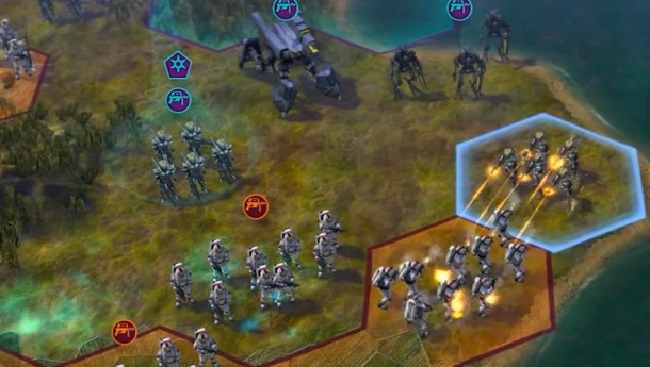
From there, Beyond Earth plays just like you usual Civilisation game, except this time quests and contextual events will pop up from time-to-time. An extra “orbital” layer is introduced for satellites and orbital units that can be used to affect the ground layer for a limited time. It doesn’t quite make up for the lack of space travel or space stations in the game, but does add a little more depth to gameplay. What gets across quite well is just how hostile the new world is, and how in the early stages of colonisation the future of humanity is anything but secure. A poisonous miasma inhabits a large percentage of the land, not to mention the aliens zealously defending their nests and otherwise inhibiting expansion.
Unlike barbarian units of past games, however, the aliens aren’t interested in attacking cities. This design feature is fantastic as it ties the philosophical aspect of the narrative to the gameplay by making players decide how to thrive in a new world. Do we leave the aliens alone and build around them in the hopes of learning more about them? Or simply steamroll (sorry, space-steamroll) over them in the name of progress?
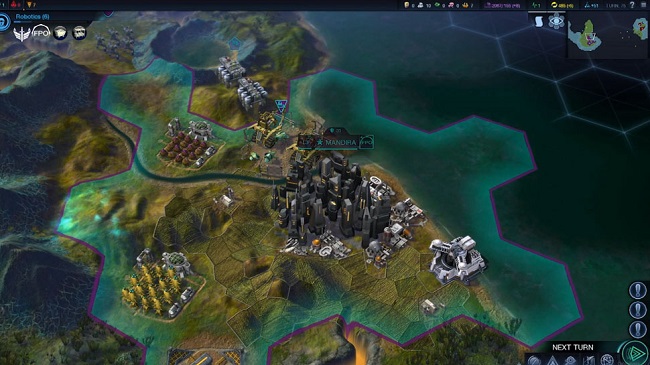
I’ll be damned if Beyond Earth didn’t send a chill up my spine when it first loaded up. From the planning cinematic featuring the lucky few escaping a near-scorched Earth to the muted dramatic sci-fi soundtrack, the tone here is of uncertainty rather than the usual optimism of the Civ series. The landscape looks alien and forbidding at times, but slowly changes as colonists implant their own philosophies on the land. At first glance, it’s not hard to see Beyond Earth as much more than a mere re-skinning of Civilization V, which is hard to disagree with.
It has the personality of a Civilization game, which is perfectly fine, but not enough of its own. With so much of the narrative buried in the civilopedia rather than being integrated with the gameplay itself, the experience comes across as shallow.The biggest gripe in Beyond Earth’s presentation is the lack of personality of each Sponsor and colony leader. Your interaction with them through diplomacy are basically identical, canned responses and there’s almost nothing to distinguish them from each other during gameplay. Personal logs in the loading screens give some insight into their personalities (and their Sponsor bonuses hint at their possible strengths), but that’s it in terms of in-game character building. True, this hasn’t ever really been a hallmark of the series, but surely the journey of humanities’ future should have a story to go with it?
 Just one more turn … ad infinium
Just one more turn … ad infinium
 Interesting philosophical system
Interesting philosophical system
 Affinity system a good addition to the series
Affinity system a good addition to the series
 Aliens add depth to gameplay
Aliens add depth to gameplay
 Tech web great for customisation
Tech web great for customisation
 Lacks personality
Lacks personality
 Little to differentiate factions
Little to differentiate factions
 Feels like a mod
Feels like a mod
 Tech web can be hard to follow
Tech web can be hard to follow
The biggest fear I had of Beyond Earth is that it would simply be “CIVS IN SPAAAAAAACE.” Civilization II was, I think, my first Civ experience, and I’ve been hooked ever since. The reason why I bring it up, is that my copy came with a sci-fi themed mod (which I don’t think was Alpha Centauri). I enjoyed the hell out of it, mostly due to the craziness of the playable races and the sheer “alieness” of the design. It had personality, where Beyond Earth just doesn’t. I can’t comment on whether Beyond Earth is a successful spiritual successor for Alpha Centauri as I’ve not played it – I’ll leave that to the Civ pros. It’s a shame Beyond Earth suffers from a few missed opportunities, a shallow narrative and a lack of personality, as it really had the potential to be a standout in the series.











